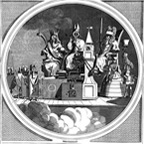Abstract [it]: Più di altre elezioni, quelle presidenziali francesi esercitano un fascino ben oltre l’occasione stessa e il paese in cui si svolgono perché, come lo ripetono giornalisti, politici o giuristi si pensa che il presidente francese è dotato di grandi poteri. Questa percezione comune costituisce un errore giuridico. L’errore è doppio e concerne tanto la nature della Costituzione quanto il modo in cui essa determina la funzione presidenziale. L’errore ha potuto emergere svilupparsi in un contesto storico particolare, ma è riuscito a mantenersi malgrado molte difficoltà di costruzione. Nel presente contributo si tratta delle questioni di ordine metodologico e teorico sollevate da questa situazione, illustrando in modo significativo il problema dell’assenza di relazioni tra norme e fatti. Si discute in seguito la struttura dell’errore costituzionale in sostanza, prima di ricostruire la genesi dei suoi elementi costitutivi. Si vedrà che gli atteggiamenti che ritengono l’attenzione del pubblico e oggi della politica italiana si appoggiano più su un modo di servitù volontaria che non sul rispetto della norma costituzionale. Il fatto che il Presidente dispone solamente di una maggioranza relativa promuove ora la riscoperta di una Costituzione parlamentare.
Abstract [en]: More than other elections, those of the French President exercise an astonishing fascination well beyond borders and its particular occasion. Indeed, many observers, journalists and academics, even specialists of public law, think and proclaim that the President enjoys important powers. This unnuanced perception constitutes a legal error, both with respect to the nature of the Constitution and with respect to the mode in which it is considered to determine the presidential function. The error could obviously have emerged in a very particular historical context, but has succeeded in maintaining itself, despite its many difficulties. The paper addresses the methodological and theoretical questions raised by this situation, which highlights the absence of relations between facts and norms. It follows a discussion of the structure of the error and a reconstruction of its development. One may then better understand that the facts which retain the attention of the public are mainly due to a form of voluntary servitude rather than to an observance of the rules of the Constitution. The present situation in which the President may only count on a relative majority in Parliament promotes a paradoxical rediscovery of a parliamentary constitutional system.






